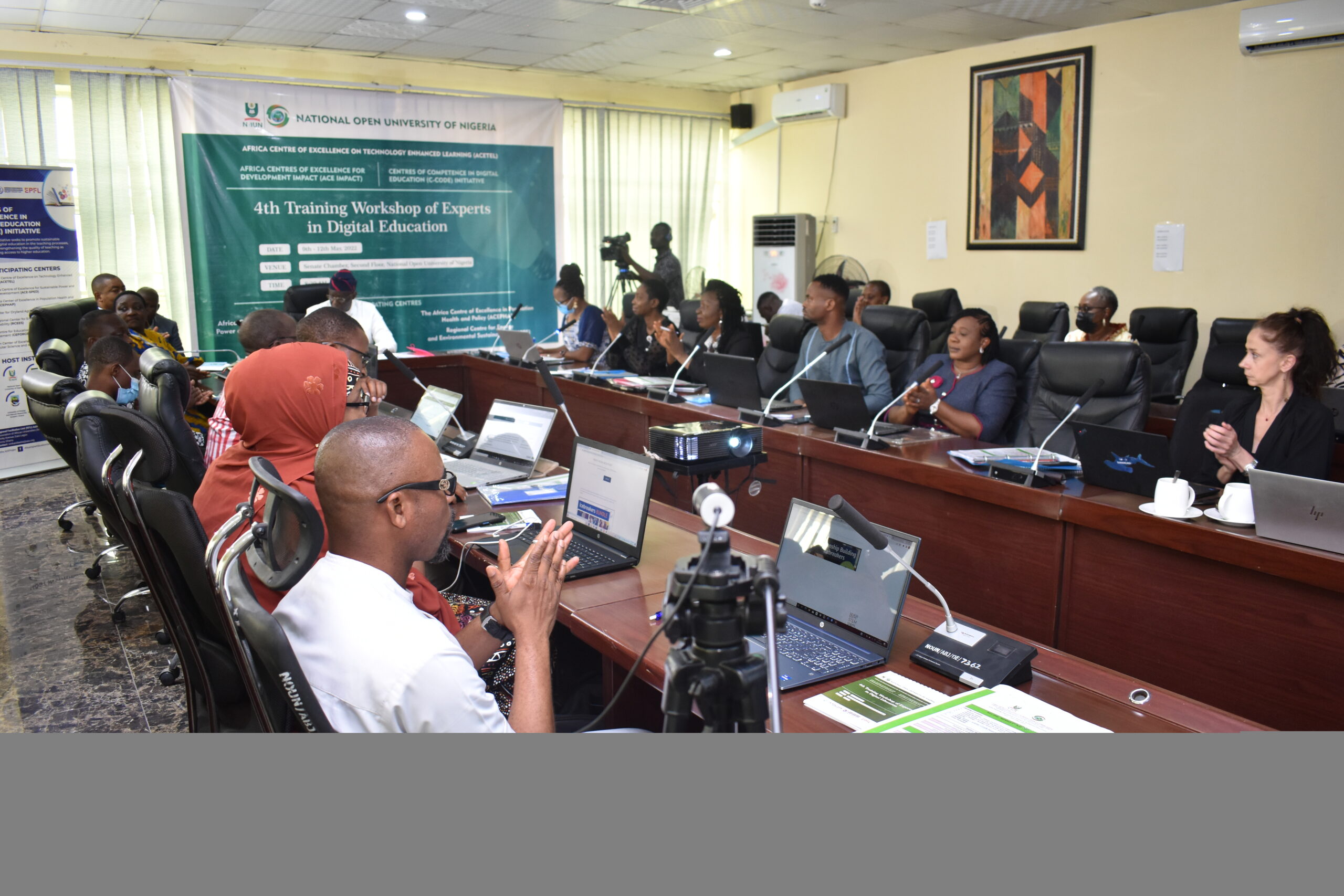The Centres of Competence in Digital Education (C-CoDE) Initiative is holding a capacity building workshop for experts in digital education, to build their capacities in the sustainable integration of digital tools and technologies in teaching and learning.
The event, holding from 9th – 12th May 2022 at the National Open University of Nigeria is jointly organized by the Africa Centre of Excellence on Technology Enhanced Learning (ACETEL), the Association of African Universities, the École polytechnique fédérale de Lausanne (Switzerland), EPFL, with financial support from the World Bank. The opening ceremony was chaired by the Vice Chancellor of the National Open University of Nigeria (NOUN), Prof. Olufemi Peters, who encouraged the participants to forge collaborative networks through the gathering, and to leverage the opportunity presented by the initiative to contribute to the development of their national economies, and that of the continent as a whole.
Speaking on behalf of the AAU, Dr. Sylvia Mkandawire, the ACE Impact Project Manager, underscored the importance of the C-CoDE initiative for the project, stating that it emerged as a COVID-19 response, to support institutions effectively deliver on their core targets. She extended the AAU’s appreciation to the Vice Chancellors and management of host institutions of the C-CoDE initiative and generally, the ACE-Impact Project, for their continuous support.
C-CoDE is an initiative being implemented under the Africa Higher Education Centres of Excellence for Development Impact (ACE Impact) Project with the objective of strengthening the techno-pedagogical skills of lecturers by promoting the use of innovative digital technologies in educational practices. Ultimately, the sustainable integration of digital education in African universities, is seen as a means to strengthen the quality of teaching as well as the competencies of graduates.
The ongoing training forms part of a series of trainings which commenced in September 2021 for the six (6) universities which are part of this initiative, namely – 1) National Open University of Nigeria 2) University of Nigeria, Nsukka 3) Bayero University, Kano, Nigeria 4) University of Energy and Natural Resources, Sunyani, Ghana, 5) Université Joseph Ki-Zerbo, Ouagadougou, Burkina Faso and 6) Université d’Abomey-Calavi, Cotonou, Bénin.
The previous online trainings have comprehensively taken participants through the broad topics of Course Design, Educational Resources, Development and Implementation, while the ongoing face to face training is focusing on Delivery and Evaluation.
It is expected that the involved universities would eventually serve other African institutions using a training-the-trainers model, within the broader ACE Impact project portfolio and across the Sub-Saharan Africa (SSA) region.
The fourth (4th) training workshop of experts in digital education which is underway, features 40 participants and is being facilitated by the EPFL, represented by Dr Lisa Danielle Myers, and Ms. Virginie Torrens who are both digital education experts. The key training content/areas include online teaching (i.e. the actual delivery of an online course to students), course evaluation, applying interactive teaching strategies to facilitate active learning, preparing students to learn online and analysing how to select and train facilitators, among others.
“Through this training of digital experts and more broadly the C-CoDE initiative, our Centre and the host University will be more equipped to deliver sound pedagogical learning resources that will improve teaching and learning in the post Covid-era” said Prof. Grace Jokthan, Centre Leader for the Africa Centre of Excellence on Technology Enhanced Learning.
Another key event holding immediately after the ongoing workshop is the ACE Impact Regional Digital Education Conference scheduled for 12th – 13th May 2022.
Participating in this conference are stakeholders from African higher education, Africa Higher Education Centres of Excellence, the National Universities Commission of Nigeria, industry players, government officials, representatives from AAU and EPFL and the C-CoDE participating centres. The C-CoDE participating centres are 1) the African Centre of Excellence on Technology Enhanced learning (ACETEL), 2) the African Centre of Excellence for Sustainable Power and Policy (ACE-SPED), 3) the African Centre of Excellence in Population Health and Policy (ACEPHAP), 4) the Centre for Dryland Agriculture (CDA), 5) the Regional Centre for Energy and Environmental Sustainability (RCEES), 6) the Regional Centre for Energy and Environmental Sustainability (CEFORGRIS) and 7) the African Centre of Excellence in Science, Mathematics, Computer Science and Applications (CEA-SMIA).
Stakeholders are encouraged to register via this link- https://forms.gle/SfoyfPix1MonBz2M8 and participate in this important conference.
